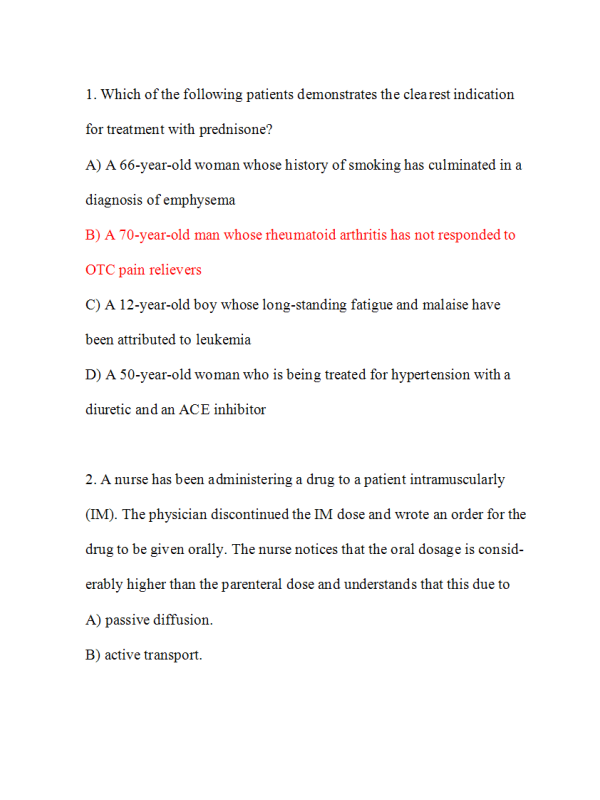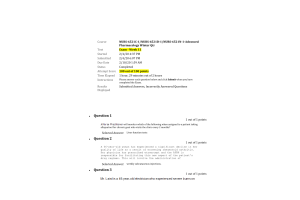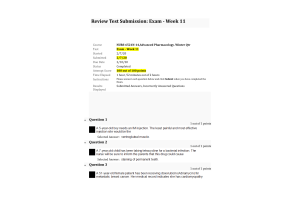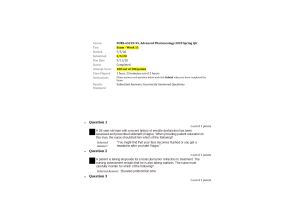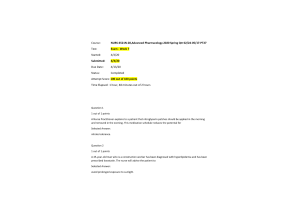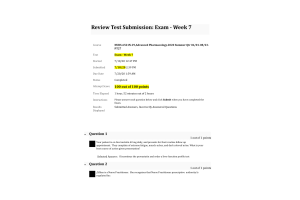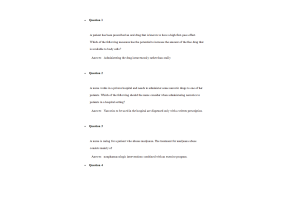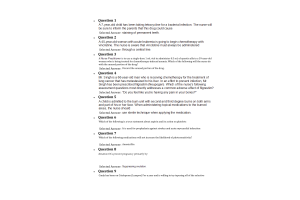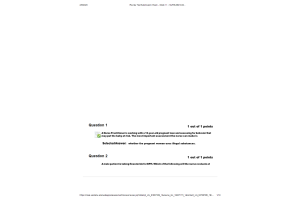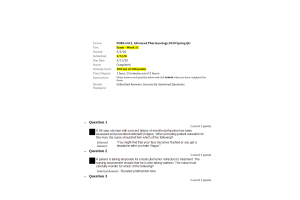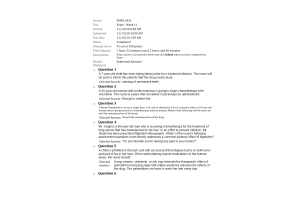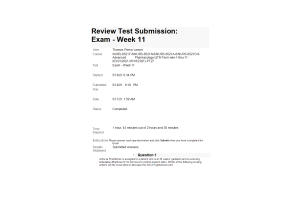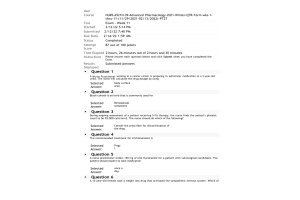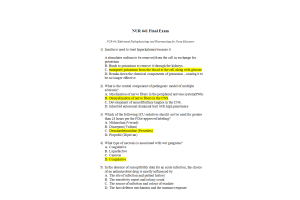NURS 6521D-6, NURS-6521F-6, NURS-6521N-6-Advanced Pharmacology; Exam - Week 7 Midterm (Correct Solutions)
- $39.00
- Question: Which of the following patients demonstrates the clearest indication for treatment with prednisone?
- Question: A nurse has been administering a drug to a patient intramuscularly (IM). The physician discontinued the IM dose and wrote an order for the drug to be given orally. The nurse notices that the oral dosage is considerably higher than the parenteral dose and understands that this due to
- Question: A nurse is caring for a postsurgical patient who has small tortuous veins and had a difficult IV insertion. The patient is now receiving IV medications on a regular basis. What is the best nursing intervention to minimize the adverse effects of this drug therapy?
- Question: A patient is in the clinic after 6 weeks of taking riluzole (Rilutek) for a recent diagnosis of amyotrophic lateral sclerosis. The nurse will prioritize assessment for which of the following?
- Question: A cardiac care nurse is monitoring a patient who is receiving lidocaine (Xylocaine) per IV infusion pump for an acute ventricular arrhythmia associated with an acute MI. Which of the following patient manifestations would cause the nurse to notify the physician immediately?
- Question: A nurse is caring for a patient who is admitted into the cardiac care unit with acute, decompensated heart failure. Nesiritide (Natrecor) has been ordered. When preparing for administration of the drug, the nurse will
- administer
- Question: A patient has been prescribed lithium therapy. Which of the following signs and symptoms will the nurse tell the patient to report immediately?
- Question: A nurse is caring for a patient who has just been diagnosed with Parkinson disease. The patient does not understand how the medication ordered, carbidopa-levodopa, is going to help her condition. Which of the following is the correct response by the nurse?
- Question: A patient is taking flavoxate hydrochloride (Urispas) to help control an overactive bladder. On a follow-up visit to the clinic, the nurse will question the patient about which of the following?
- Question: A nurse notes new drug orders for a patient who is already getting several medications. Which of the following is the most important con- sideration when preparing to administer the new drugs?
- Question: A nurse is discussing with a patient the efficacy of a drug that his physician has suggested, and he begin taking. Efficacy of a drug means which of the following?
- Question: A nurse is conducting a medication resolution of a new resident of a care facility and notes that the woman has been taking neostigmine. The nurse should recognize that the woman may have a history of what
- Question: A 77-year-old man's chronic heart failure is being treated with a regimen of quinapril (Accupril) and furosemide (Lasix). Which of the following assessment findings would suggest that the loop diuretic is con- tributing to a therapeutic effect?
- Question: A nurse explains to a patient that nitroglycerin patches should be ap- plied in the morning and removed in the evening. This medication schedule reduces the potential for
- Question: A nurse who provides care on a busy medical unit of a large hospital is constantly faced with new drugs on patients' medication administration records. What strategy should the nurse employ to foster up-to-date information about the nursing management of new or uncommon drugs?
- Question: A 58-year-old man is admitted to the emergency department. A diagnosis of severe digoxin toxicity is made. Bradycardia is present, and an electrocardiogram (ECG) confirms toxicity. The nurse will administer which of the following drugs?
- Question: A hospital patient's physician has prescribed quetiapine (Seroquel) to be administered at bedtime. Being unfamiliar with the medication, the nurse has looked it up in a nursing drug manual and noted that the drug is an antipsychotic that is indicated for the treatment of schizophrenia and bipolar disorder. The patient has no psychiatric history, and upon questioning, the physician states that it is being prescribed to help the patient fall asleep at night. How should the nurse best understand this practice?
- Question: A 4-year-old child is brought to the emergency department by her mother. The mother reports that the child has been vomiting, and the nurse notes that the child's face is flushed and she is diaphoretic. The mother thinks that the child may have swallowed carbachol drops. A diagnosis of cholinergic poisoning is made. Which of the following drugs would be administered?
- Question: A nurse is providing discharge instructions to a patient who will be taking fludrocortisone at home. The nurse will encourage the patient to eat a diet that is
- Question: A nurse is developing a care plan for a patient who has multiple sclerosis. An expected outcome for the patient who is receiving glatiramer would be a decrease in
- Question: An elderly postsurgical patient has developed postoperative pneumonia in the days following abdominal surgery and is being treated with a number of medications. Which of the following medications that the nurse will administer has the slowest absorption?
- Question: A female patient diagnosed with chronic atrial flutter has been pre- scribed verapamil in conjunction with digoxin to control ventricular rate.
- Question: A 28-year-old patient asks his nurse how phenelzine therapy would help him. An appropriate response by the nurse would be
- Question: A nurse is creating a plan of care for a 68-year-old woman with a re- cent diagnosis of unstable angina and new prescription for nitroglycerin. Which of the following nursing diagnoses should the nurse prioritize in the planning of this patient's care?
- Question: A nurse is caring for a 38-year-old female patient who just started taking lithium for bipolar disorder. Which of the following outcomes would be most appropriate for this patient?
- Question: A nurse is caring for a patient who is taking sodium polystyrene sulfonate (Kayexalate) therapy. The nurse will monitor for which of the following?
- Question: A nurse is the cardiac care unit is preparing to hang an intravenous dose of dofetilide (Tikosyn) for a patient who has just been admitted. What is the most likely goal of this intervention?
- Question: A nurse is working in a women's hospital where she is caring for a new mother who is experiencing postpartum urinary retention. Bethanechol (Urecholine) has been ordered. The nurse will observe for which of the following?
- Question: A 12-year-old child who has been taking sertraline for the past 2 weeks has returned to the clinic to be seen. It will be critical for the nurse to assess for
- Question: A 30-year-old woman is taking phenelzine (Nardil) 30mg PO tid. The nurse knows that at that dosage, the patient will need to be carefully
- Question: A patient has been admitted to the intensive care unit following a myocardial infarction. His nurse is preparing to administer his ordered medications when she notices that one drug ordered is used for treating seizure disorders. The nurse does not find a history of seizures in the patient's record. The most appropriate action for the nurse is to
- Question: A nurse is aware of the high incidence and prevalence of major de- pression in the population. Which of the following individuals possesses the clearest risk factors for depression?
- Question: The nurse has been assigned a 49-year-old patient who has acute col- itis, and the nurse just completed gathering data concerning core drug knowledge and core patient variables. To implement nursing management of drug therapy for this patient, the nurse will then
- Question: A nurse has been caring for a 49-year-old man who was hospitalized with recurrent ventricular fibrillation and received IV amiodarone. The man is now scheduled to be discharged on oral amiodarone, and the nurse has just completed discharge instructions. Which of the following statements made by the patient indicates that further instruction is necessary?
- Question: A 73-year-old man was diagnosed with Parkinson disease earlier this year and has begun taking carbidopa-levodopa four times daily in an effort to control the signs and symptoms of the disease. The nurse should recognize that this therapeutic effect is achieved by influencing the
- Question: A patient is admitted to the emergency department with severe chest pain. The emergency department physician orders intravenous nitroglycerin 5 mcg/min, titrate dose by 5 mcg/min every 3 to 5 minutes per infusion pump as needed. Before administering the nitroglycerin, the nurse should prioritize which of the following assessments?
- Question: A patient has been prescribed several drugs and fluids to be given intravenously. Before the nurse starts the intravenous administration, a priority assessment of the patient will be to note the
- Question: Which of the following patients would a nurse determine to be at the greatest risk for quinidine toxicity?
- Question: A nurse is assigned to a patient who is taking lithium. Which of the following drug serum levels would indicate that the patient is at risk for adverse effects of the drug?
- Question: A patient experiencing a serious allergic reaction to a bee sting is brought to the emergency department. The patient's right hand is swollen, red, and painful. She is extremely upset, short of breath, and the nurse detects wheezing and stridor. The nurse is ordered to administer epinephrine to relieve the patient's
- Question: A nurse is educating a patient who has Parkinson disease and her husband about the possible adverse effects of carbidopa-levodopa. The nurse should emphasize the need for the patient and her husband to monitor for any sudden increase in
- 42.Questio:A nurse has an order to apply nitroglycerin topically, twice a day. The nurse's initial action will be to
- Question: A woman with an inflammatory skin disorder has begun taking prednisone in an effort to control the signs and symptoms of her disease. The nurse who is providing care for this patient should prioritize which of the following potential nursing diagnoses in the organization of the patient's care?
- Question: A 38-year-old patient is obese and has abscesses around his inner thigh muscles. He is receiving IV antibiotics, but no improvement has been seen. The patient questions the nurse about the most likely cause for the drug therapy failure. The nurse explains to the patient that the
- Question: A patient is prescribed regular doses of epinephrine. Which of the following nursing diagnoses is related to comfort and would be most ap- propriate for this patient?
- Question: A 68-year-old female patient who was diagnosed with hypertension 2 weeks ago and was prescribed a new hypertension medication has re- turned to the clinic for a follow-up visit. The nurse notes that the patient's blood pressure is unchanged from her last clinic visit. When the patient was asked if she was taking the new medication on a regular basis, she stated, "I thought that I was supposed to take the new drug when I had a pounding headache or was in a stressful situation, not all the time." An appropriate nursing diagnosis for this patient would be which of the following?
- Question: A nurse is overseeing the care of a young man whose ulcerative coli- tis is being treated with oral prednisone. Which of the following actions should the nurse take in order to minimize the potential for adverse drug effects and risks associated with prednisone treatment? the patient for infections
- Question: A nurse is performing an admission assessment of an elderly patient who is being admitted to a medical ward from the emergency department. Which of the following is an open-ended assessment question?
- Question: In order to promote therapeutic drug effects, the nurse should always encourage patients to
- Question: Frequent episodes of exercise-related chest pain have caused a 79- year-old woman to use her prescribed nitroglycerin spray several times in recent weeks. This patient's age will have what effect on her use of nitroglycerin?
- Question: A 47-year-old woman has been diagnosed with open-angle glaucoma. Pilocarpine drops are prescribed. The nurse's assessment reveals that the patient has worn soft contact lenses for 15 years. The nurse will instruct the patient to
- Question: A nurse who provides care on an acute medicine unit has frequently recommended the use of nicotine replacement gum for patients who ex- press a willingness to quit smoking during their admission or following their discharge. For which of the following patients would nicotine gum be contraindicated?
- Question: A patient calls the clinic and reports that he is having chest pain. The patient states that "I'm scared that I am going to die and I've been pacing up and down my driveway." After calming the patient, the initial instruction by the nurse would be to
- Question: Constipation is a major problem in patients with amyotrophic lateral sclerosis (ALS). The nurse will educate the patient and family to
- Question: A nurse has been assigned to care for a 52-year-old attorney who has hypertension and peptic ulcer disease. Before administering his medications, the nurse must complete an initial assessment. Core patient variables will be obtained from which of the following? (Select all that ap- ply.)
- Question: A 59-year-old woman has long-standing diagnoses of type 1 diabetes and hypertension and has recently been diagnosed with glaucoma. Her ophthalmologist has prescribed pilocarpine (Akarpine), which will achieve its intended therapeutic effect by which of the following means?
- Question: A woman in her twenties has been accompanied to her primary care provider by her mother, who states that her daughter has been experiencing increasingly severe episodes of irritable grandiose behavior. The care provider has consequently begun a treatment regimen that includes pharmacological therapies. This patient is most likely experiencing which of the following mood disorders?
- Question: A patient is treated with an antibiotic for an infection in his leg. After 2 days of taking the antibiotic, the patient calls the clinic and reports that he has a rash all over his body. The nurse is aware that a rash can be an adverse effect of an antibiotic and can be either a biologic, chemical, or physiologic action of the drug, which is an example of
- Question: A 70-year-old man with diabetes mellitus is taking metoprolol (Lo- pressor) to manage his hypertension. The nurse would be sure to instruct the patient to
- Question: A 45-year-old man enters the emergency department complaining of chest pain. The nurse has an order to administer amyl nitrite. The nurse will
- Question: Mrs. Houston is a 78-year-old woman who resides in an assisted living facility. Her doctor prescribed digoxin at her last visit to the clinic and she has approached the nurse who makes regular visits to the assisted-living facility about this new drug. What teaching point should the nurse emphasize to Mrs. Houston?
- Question: A 62-year-old man is admitted to the hospital with a diagnosis of chest pain. He has an order for 0.3 mg of sublingual nitroglycerin prn for chest pain. Which of the following actions should the nurse do first when he complains of chest pain?
- Question: A nurse on an acute medical unit has rectally administered a dose of sodium polystyrene sulfonate to a patient. What assessment should the nurse prioritize in the 48 hours following the administration of this drug?
- Question: An expected outcome for a patient who has just taken sublingual nitroglycerin should be
- Question: Which of the following patients should be advised by the nurse to avoid over-the-counter cold and allergy preparations that contain phenylephrine?
- Question: Which of the following would be an expected outcome in a patient who has been given atropine during a medical emergency?
- Question: A 53-year-old man has been treated for severe asthma for several years with prednisone. Recently, his physician initiated alternate-day therapy for him. The patient tells the nurse that he would rather take the medication every day to prevent confusion. Which of the following would be the best response by the nurse?
- Question: A middle-aged male patient has received a diagnosis of amyotrophic lateral sclerosis (ALS) and has begun treatment with riluzole (Rilutek). The patient's nurse should recognize what goal of this treatment regimen?
- Question: A patient has been prescribed an oral drug that is known to have a high first-pass effect. Which of the following measures has the potential to increase the amount of the free drug that is available to body cells?
- Question: A patient has been receiving regular doses of an agonist for 2 weeks. Which of the following should the nurse anticipate?
- Question: After seeking care for tremors that have become increasingly severe in recent months, a 71-year-old man has been diagnosed with Parkinson disease and will soon begin treatment with carbidopa-levodopa. Which of the following statements indicates that the patient has an accurate understanding of his new medication?
- Question: A nurse is caring for a patient who is taking metoprolol (Lopressor). Which of the following statements would indicate that teaching by the nurse concerning the beta-adrenergic antagonist has been effective?
- Question: A female patient has been taking prednisone for her asthma for 1 month. The nurse will teach her to gradually decrease her dose of prednisone to avoid
- Question: A 21-year-old man experienced massive trauma and blood loss during a motorcycle accident and has been started on a dopamine infusion upon his arrival at the hospital. In light of this drug treatment, what assessment should the care team prioritize?
- Question: A 58-year-old woman was diagnosed with myasthenia gravis many years ago and has been on a regimen of neostigmine (Prostigmin), a reversible cholinesterase inhibitor. In light of the patient's drug regimen, a nurse can conclude that the pathophysiology of myasthenia gravis in- volves
- Question: A nurse has been assigned to a 52-year-old woman who has been hospitalized and has a diagnosis of Parkinson disease. The patient has been taking carbidopa-levodopa for about 1 year. The patient states that she has been having "more side effects from her drugs lately" and the nurse observes that the client appears to be lethargic and have a de- creased attention span. Which of the following would be an appropriate nursing diagnosis based on the statement of the patient and the observations of the nurse?
- Question: A patient who is going on a cruise is concerned about motion sick- ness and sees his physician, who prescribes scopolamine. The nurse in- forms the patient that using scopolamine may cause him to experience
- Question: A nurse is providing patient education to a female patient who is taking fludrocortisone. The nurse will instruct the patient to monitor which of the following at home?
- Question: A female patient has been prescribed aminoglutethimide to treat Cushing syndrome. Before therapy begins a priority nursing action would be to review the patient's
- Question: A nurse is caring for a patient in the critical care unit. Phentolamine (Regitine, OraVerse) has been ordered for the management of tissue necrosis caused by extravasation of parenterally administered drugs. Before administering this drug, the nurse will check the patient's chart for indications of
- Question: A 28-year-old man has been taking sertraline for a few months. On a follow-up visit to the clinic, he reports a change in sexual functioning, dizziness, and insomnia. The most appropriate response by the nursewould be
- Question: A resident of a long-term care facility receives 12.5 mg metoprolol (Lopressor) at 8 AM and 8 PM daily. Before administering this drug, the nurse should perform and document what assessments?
- Question: A 59-year-old female patient has been prescribed digoxin. The nurse assigned to the patient will instruct her to avoid which of the following?
- Question: A female patient is taking 0.125 mg of digoxin daily for heart failure. At a recent clinic visit she reports that since she has been on the drug, she can breathe better and her heart rate has been around 74 beats per minute. The nurse weighs the patient and notices that she has gained 10 pounds since the digoxin therapy was started. The patient is concerned that the additional weight will necessitate an increase in the medication. Which of the following is an appropriate response by the nurse?
- Question: A middle-aged patient was diagnosed with major depression after a suicide attempt several months ago and has failed to respond appreciably to treatment with SSRIs. As a result, his psychiatrist has prescribed phenelzine. When planning this patient's subsequent care, what nursing diagnosis should the nurse prioritize?
- Question: A woman in her thirties has been experiencing increasing weakness and the results of an edrophonium (Tensilon) test have resulted in a diagnosis of myasthenia gravis. The patient's nurse should anticipate that the patient will benefit from treatment with
- Question: A nurse is caring for a patient admitted to the intensive care unit be- cause of heart failure. The patient is prescribed digoxin. Which of the following nursing diagnoses would be appropriate for this patient?
- Question: Which of the following activities would the nurse expect to complete during the evaluation phase of the nursing process in drug therapy?
- Question: A patient is taking tocainide for a life-threatening ventricular arrhythmia. The most serious potential adverse effects involve
- Question: A nurse in the intensive care unit is caring for a patient in shock and has started IV administration of dopamine (Intropin). For a patient in shock, dopamine helps to
- Question: A 42-year-old African-American man with congestive heart failure has been prescribed hydralazine-isosorbide. The nurse will closely monitor for which of the following?
- Question: After successful treatment for a myocardial infarction, a 69-year-old man has developed a ventricular arrhythmia. His care team has opted for treatment with a Class II antiarrhythmic. The nurse would understand that this patient is likely to be prescribed
- Question: A patient has been prescribed aminoglutethimide 250 mg PO q6h to increase to 2g daily over the next several weeks. The nurse should recognize that this patient most likely has a diagnosis of as asthma.
- Question: A patient has a diagnosis of Parkinson disease, and the physician will prescribe carbidopa-levodopa. Before drug therapy, the patient should be carefully assessed for the presence of
- Question: A normal maintenance dose for digoxin is 0.125 to 0.5 mg/day. In which of the following patients would the nurse most likely administer a lower-than-normal maintenance dose of digoxin?
- Question: In which of the following patients would a nurse expect to experience alterations in drug metabolism?
- Question: A patient with class-IV CHF has a medication regimen consisting of metoprolol (Lopressor), enalapril (Vasotec), and furosemide (Lasix). In addition to regularly assessing the patient s heart rate, the nurse should prioritize assessment of the patient's
- Question: A nurse is caring for a patient who is taking metoprolol (Lopressor). Which of the following statements would indicate that teaching by the nurse concerning the beta-adrenergic antagonist has been effect:
- Question: A nurse is developing a care plan for a patient who has multiple sclerosis. An expected outcome for the patient who is receiving glatiramer would be a decrease in
- Question: An elderly postsurgical patient has developed postoperative pneumonia in the days following abdominal surgery and is being treated with a number of medications. Which of the following medications that the nurse will administer has the slowest absorption?
